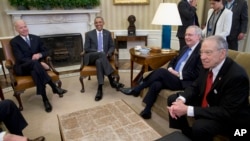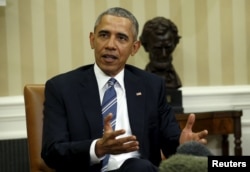U.S. President Barack Obama and key Republican senators ended brief talks at the White House on Tuesday firmly at odds over who should fill the Supreme Court seat left vacant by the sudden death of Justice Antonin Scalia.
Obama conferred with Senate Majority Leader Mitch McConnell and Judiciary Committee Chairman Chuck Grassley in the Oval Office, along with leading members of his Democratic Party - Vice President Joe Biden, Senate Minority Leader Harry Reid and Senator Patrick Leahy.
The normal differences of opinion between the two main U.S. political parties on a Supreme Court nomination have taken on a new intensity this year because it is expected a new justice would tip the court's ideological balance in either a conservative or liberal direction. And the specifics of when and how the Senate should consider a new nomination are complicated by the fact this is a U.S. presidential election year.
Obama, who will remain in office until late January 2017, says it is his constitutional responsibility to choose a Supreme Court nominee promptly, and that the Republican-controlled Senate is obligated to hold confirmation hearings on his pick. Many Republicans insist the court vacancy must not be filled until after the November election, and they have said they will not consider - nor even hold informal meetings with - whoever Obama nominates.
The meeting was a good opportunity for Republicans to "reiterate that this appointment should be made by the next president," said McConnell.
"This vacancy will not be filled this year,” insisted the Senate majority leader. “We will look forward to the American people, who they want to make this appointment through their own votes."
Democratic Senators Reid and Leahy accused Republicans of trying to politicize the nation’s high court.
Although Republicans are “adamant” that they will not hold hearings, Reid said, under the U.S. Constitution the Senate is “obligated to hold hearings [and] they are obligated to vote” for or against the president's choice for the high court.
Reid said the party leaders' meeting in the Oval Office was “very short,” but Obama made clear to the Republicans that he will consider any judicial candidate they propose to him.
Leahy said the Republicans' tactics will not affect Senate Democrats. “We are not going to play their game of obstruction," he said. "We are going to do our jobs like we’re supposed to.”
Republicans contend that Obama should not make an appointment to the Supreme Court - a lifetime position - during his final year as president, and that he should instead leave the task to his successor, who will take power in 2017.
The White House says the president has spent a significant amount of time reviewing potential nominees, but the list of potential candidates still is not finalized. Administration officials note that Obama spent about 30 days selecting his nominee on the two previous occasions when a Supreme Court vacancy occurred during his administration.
Spokesman Josh Earnest said the White House is open to future consultations with Republicans who want to engage “seriously” about filling the vacancy.
“I can tell you that the offer was not a one-time-only offer” Earnest told reporters at a briefing after Tuesday’s meeting. “The next move would be for Republicans to avail themselves to consult with the president if they choose to do so.“
Meanwhile, Earnest said, the White House will “push forward” to select a Supreme Court nominee.













